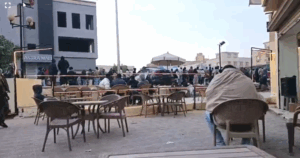Prosecutor summons Sudan press again over meeting with EU diplomats
The state security prosecutor summoned a number of journalists to appear before the prosecutor in Khartoum on Tuesday. A source said that the summonses were attributed to a complaint filed by the security apparatus against the journalists who participated in a meeting with EU ambassadors.
 Newspaper kiosk in Khartoum (File photo: SUNA)
Newspaper kiosk in Khartoum (File photo: SUNA)
The state security prosecutor summoned a number of journalists to appear before the prosecutor in Khartoum on Tuesday. A source said that the summonses were attributed to a complaint filed by the security apparatus against the journalists who participated in a meeting with EU ambassadors.
Osman Mirghani, editor-in-chief of El Tayyar newspaper, Ashraf Abdelaziz, editor-in-chief of El Jareeda newspaper, and journalists Maha El Tilib and Shamayel El Nour from El Tayyar newspaper, and Lina Yagoub of Baj News, all received orders from the state security prosecutor to appear before him on Tuesday.
EU meeting
On October 2, a number of European ambassadors and the US Chargé d’Affaires met with a number of editors-in-chief and journalists to discuss press freedom in the country.
In a statement released after the meeting, EU Ambassador Jean-Michel Dumond said he would discuss the situation of the press in the country with the Sudanese government. He pointed to the 2020 election and the importance of human rights and democracy in the country.
In response, Dumond was summoned by the Ministry of Foreign Affairs. The Ministry said in a statement on Wednesday that they told the EU ambassador that the way the meeting was organised exceeded diplomatic norms and guidelines.
The Ministry also expressed its surprise that the meeting addressed “unresolved issues such as [the recent amendments of] the Press and Publication Act, which is still being debated by the institutions concerned”.
Ongoing media curbs
The Media in Sudan are continuously subjected to confiscations of newspapers, and summons and detentions of journalists.
In the end of June, the cabinet extended the power of the government-controlled Press and Publications Council as well as restrictions on the media to online news outlets, when it passed amendments of the Media and Publication Act. A month later, the NISS restored prior-censorship of newspapers.
In early August, editors-in-chief and the head of the NISS in Khartoum agreed in a meeting to form a committee to deliberate on the so-called red lines set by the security apparatus for Sudanese media. New confiscations of newspapers were therefore briefly suspended.
However, the NISS began gagging the press again on August 27, when the print-runs of El Jareeda and El Tayyar were confiscated. No explanations were given. Four days later, NISS officers stopped the distribution of El Jareeda and El Tayyar again, together with the print-run of El Rai El Aam, without stating a reason.
Abdelaziz told Radio Dabanga at the time that “in the past there used to be ‘red lines’ not to criticise the president or vice-presidents of Sudan, members of the security apparatus, and the police. However, these lines have become very unclear and unpredictable now”.
In early September, three young journalists were summoned by security agents in Khartoum and El Gedaref. A Sudanese reporter was banned from writing. The print-run of El Saiha daily, the newspaper he was writing for, was confiscated on September 8.
Sudan is ranked at the bottom of the World Press Freedom Index by Reporters Without Borders.











 and then
and then